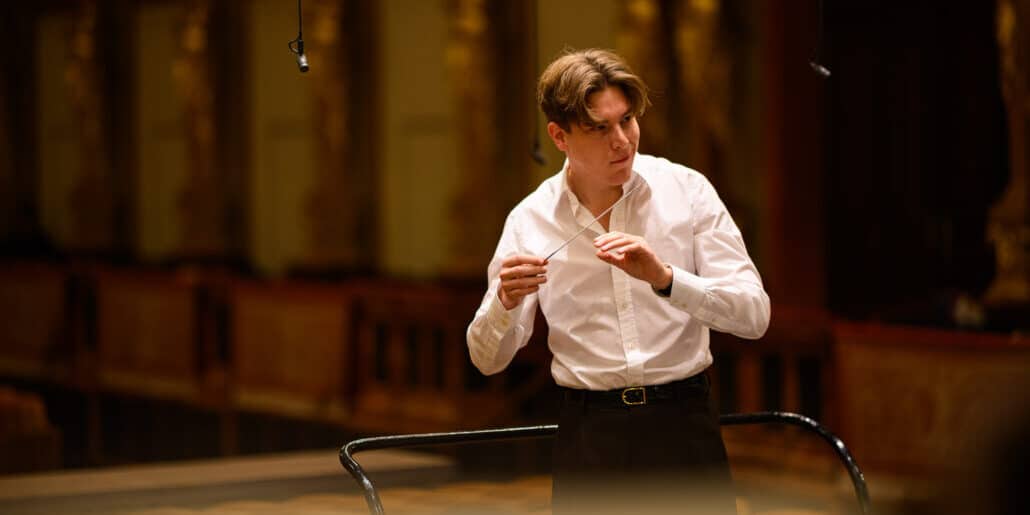Barenboim gets Bake-off treatment on British TV
mainThe unseen 1970 Christopher Nupen films of Daniel Barenboim are to be presented on Channel 4 by the comedian Sandi Toksvig.
Sandi says; “Beethoven has meant so much to me. It broke my heart to learn that towards the end of his life he became profoundly deaf. Imagine being the creator of sublime music and yet unable to hear it but his response to this tragedy was to declare – “I will seize fate by the throat; it shall certainly never wholly overcome me.” I think of that each time I feel knocked down by something. If Beethoven could keep going when he couldn’t hear then we too can grab fate by the throat and do our best to turn life into what we choose. Fate is not in charge.”

Er…. towards the end of his life? Beethoven was 31 when he wrote the Heiligenstadt Testament in which he told his brothers that he was now profoundly deaf. British television seems to have an inexhaustible supply of what the Russians would call ‘useful idiots’.
Ms Toskvig is a presenter on its Bake-off programmes.
Beethoven would have told her to baker off.





Well at least it has made your blood pressure rise, Norman, even if the presentation itself might fall rather flat in terms of accuracy.
So she made a factual mistake. I think even the slightest inquiry would prove that Sandi Toksvig is anything but an idiot.
And here she has grasped the essential lesson from Beethoven’s situation and declaration and applies it in a way that is meant to inspire people to carry on in hope.
And she has not participated in Bake-Off for over a year.
There may well be many “useful idiots” in British television, but as someone who watches a great deal of it through the internet, I am more often awed by the calibre of the downplayed intelligence of so many who appear. And in a lot of the writing and production values, all of which attest to education, research, attention, range of interests and abilities that make British television the envy of the world.
This woman hosts QI, a programme I know is not to every taste but a bite of which every once in a while introduces me to something I really did not know and that interests me sufficiently to read further. Presented by comedians, many of whom can discourse with intelligence when the subject comes up.
I am aware that, with access to many streaming services, I have a large canvas and can cherry-pick, but I think I see a representative sample of what British television has to offer.
I would be very intrigued to know what other British television personalities you considered to be “useful idiots.”
Very well argued VL! Bravo.
Bravo again V.Lind.
BBC will be the first victim of the new dispensation, I fear . . . The new overlords will not want witnesses.
Beethoven was not profoundly deaf at thirty one: he had lost some high frequencies and suffered from tinnitus. He only became profoundly deaf, needing ear trumpets and then conversation books, in his last decade – and even then his hearing came back occasionally.
I was about to say the same.
“She read law, archaeology and anthropology at Girton College, Cambridge, graduating with a first-class degree and receiving two prizes for outstanding achievement (The Raemakers and the Theresa Montefiore Awards). One of her law supervisors was Lord Denning.”
Thus spake Wikipedia. If this is an example of a useful idiot I’m in awe.
Why did she switch to bake-off programmes?
A job is a job.
That was the result of a “slight inquiry.” Thank you.
Her name is Sandi Toksvig, not Toskvig, according to wikipedia.
Oh, dear. A mistake — and, according to Luca, above, she didn’t even make one.
I believe NL has appeared on British television… 🙂
Beethoven’s was completely 100% deaf as from 1814.
Isn’t there some evidence that he kept a little bit of hearing into the 1820’s?
Every credible biographer dates his deafness to 1802; he gave up performing five years later, not as an old man.
Czerny apparently thought it was more graduated. He began to have difficulty hearing as early as 1798, but had lost almost total hearing by the time he was in his mid-40s. As he died at 56, it could be said his total hearing loss was later rather than earlier in his life.
But even if one accepted the opposing view, that hardly makes someone an idiot, useful or otherwise. Sandi Toksvig is a widely accomplished woman, and nothing I can see disqualifies her from presenting a programme, even on the sainted Ludwig. For all I know, and I suspect for all you know, she is very musically educated. She came from a highly educated family.
I would have thought that, given your occasional laments at the lack of support offered to classical music by people from outside that world — though I acknowledge that you are usually referring to politicians — that you would welcome a classical music programme fronted by someone with a wide following.
So, fourteen minutes past six?
If you are saying I had an entire book run pulped, you are outrageously mistaken (or misinformed by the New York Times). 70 UK copies were withdrawn. All other editions were untouched. There was no libellous misstatement. Now withdraw your statement, or leave this site.
It’s spelt ‘Toksvig’ you buffoon. The least you can do if you’re going to criticise others is get your own house in order. And Dave Brubeck’s mother – checks again… – no still not English.
Sandi Toksvig’s only mis-step (not a mistake) is to mention the profound deafness of his later years and then to quote from the Heiligenstadt document of 1802, in which he did *not* say he was profoundly deaf. He was, however indeed responding to the tragedy of realizing that he could become so. His hearing condition worsened gradually from 1802 on. But his pupil Czerny said he could still hear speech and music up to 1812.
“In April and May 1814, playing in his Archduke Trio, Beethoven made his last public appearances as a soloist. The composer Louis Spohr noted: “the piano was badly out of tune, which Beethoven minded little, since he did not hear it … there was scarcely anything left of the virtuosity of the artist … I was deeply saddened.” (quoted from Wikipedia)
Sandi Toksvig is brilliant, highly educated, witty and entertaining, and has made an excellent career (not just as a comedian) in radio and television. Nothing at all to sneer at.
I must correct myself: the quote is not from the Heiligenstadt document, but from a letter of 1800 to Franz Wegeler.
Oh Norman . . . .
Your only mistake, NL, was to couple the adjective “useful” with the noun “idiot”
At least Ms Toksvig can say it in Latin!
Just because classical music is our focus doesn’t mean it’s everybody’s. We’re all ignorant, just about different things.
Sandy Toksvig says that Beethoven has meant a lot to her. That suggests some application. For all you or I know she is an accomplished player, or a serious student of music. Stephen Fry has done a programme on Wagner, and it struck me as pretty well informed. Just because classical music is out focus doesn’t mean others can’t know something about it too. People, especially intellectually curious people, and those equipped to follow their interests, can know a good deal about quite a lot of things.
Your point is well worth making, and V. Lind is also right, not having classical music as a focus does not equal knowing nothing about it. One of the delights of Sandi Toksvig is that she never disguises her learning and intelligence and never talks down to her audience. I would bet she knows as much about Beethoven as the average well-informed amateur of music does, and very likely more. The ignorance on this particular thread lies elsewhere!
As a self-taught classical music enthusiast, I despair at some of the intellectual snobbery that pervades this blog. Channel Four is to show all of these films on its More 4 platform from 8.20 pm next Saturday into Sunday. These will make, I imagine, interesting and stimulating viewing. Still there must be complaints and snide comments. The BBC comes in for constant battering on this blog. Then Classic FM’s playlist is boring. What do these people want? Is it a particularly British (or is it just English) thing to be dissatisfied with everything? Clearly they don’t know when they’re lucky. So what if some of the presentation is simplistic? If it brings some more people into the concert halls, then so much the better. Or could it be that some people don’t want the plebs to take an interest in ‘their’ world. Their innate sense of superiority may be challenged.
According to the latest research by musicologist Theodore Albrecht, newly unearthed evidence suggests Beethoven continued to have some hearing up until about 1826. He died in 1827 so that seems quite late in life.
Read Beethoven’s Heiligenstadt Testament of 1802. It tells you in the most self-revealing terms how deaf he was at age 31 and what he meant to do about it. He could not hear a shepherd play his flute when he walked right beside him. The ‘newly unearthed evidence’ has little bearing on the reality of his life.
Dear Mr. Lebrecht, I cannot find the German text, but in English it says “But what a humiliation for me when someone standing next to me heard a flute *in the distance* and I heard nothing, or someone standing next to me heard a shepherd singing and again I heard nothing.” In this case I do think you might gracefully admit that Ms Toksvig has it right.
Beethoven was not profoundly deaf at 31, when he wrote the Testament. This was the point at which he knew that he was losing his hearing. As late as 1808, seven years after this, he still could hear well enough to play his Fourth Piano Concerto with orchestra. From what I can glean on line, he was completely deaf only for about the last decade of his life. So Sandi had it right, apparently, and Norman had it wrong.
Read the Testament. Read Spohr on the premiere of the 4th concerto. He was unable to hear a thing and never gave another piano performance. I won’t keep repeating this, but I have read all the primary sources and you have not.
Absolutely right. The Heiligenstadt document is easily found and people can read it for themselves. NL draws attention to Spohr’s hilarious anecdote (which he got from Seyfried, the music director of the Theater an der Wien), about the first performance of the fourth Piano Concerto. As far as I can see deafness isn’t mentioned in it, but here it is (in English):
Beethoven was playing a new Pianoforte-Concerto of his, but forgot at the first tutti that he was a solo player, and springing up, began to direct in his usual way. At the first sforzando he threw out his arms so wide asunder that he knocked both the lights off the piano upon the ground. The audience laughed, and Beethoven was so incensed at this disturbance, that he made the orchestra cease playing, and begin anew. Seyfried, fearing that a repetition of the accident would occur at the same passage, bade two boys of the chorus place themselves on either side of Beethoven, and hold the lights in their hands. One of the boys innocently approached nearer, and was reading also the notes of the piano-part. When therefore the fatal sforzando came, he received from Beethoven’s outthrown right hand so smart a blow on the mouth, that the poor boy let fall the light from terror. The other boy, more cautious, had followed with anxious eyes every motion of Beethoven, and by stooping suddenly at the eventful moment he avoided the slap on the mouth. If the public were unable to restrain their laughter before, they could now much less, and broke out into a regular bacchanalian roar. Beethoven got into such a rage that at the first chords of the solo, half a dozen strings broke. Every endeavor of the real lovers of music to restore calm and attention were for the moment fruitless. The first Allegro of the Concerto was therefore lost to the public.
I would hardly use a word like idiot to refer to Sandi Toksvig.
for me it would have been a lot more pleasant to watch if she had left the talking to Barenboim.